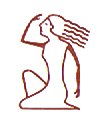|
THE D TABLET
Let's therefore move on to line Da3, which evidently is special, exhibiting a structure covering the first 15 days of July:
The basic rhythm is 3.
... Midsummer is the flowering season of the oak, which is the tree of endurance and triumph, and like the ash is said to 'court the lightning flash'. Its roots are believed to extend as deep underground as its branches rise in the air - Virgil mentions this - which makes it emblematic of a god whose law runs both in Heaven and in the Underworld ... The month, which takes its name from Juppiter the oak-god, begins on June 10th and ends of July 7th. Midway comes St. John's Day, June 24th, the day on which the oak-king was sacrificially burned alive. The Celtic year was divided into two halves with the second half beginning in July, apparently after a seven-day wake, or funeral feast, in the oak-king's honour ...
The 'bÝrd man' in Da3-2 can be compared with the following 4 true manu rere figures
But the eye-catching wind (matagi) people are 5 in number. Although the last one is not quite as strong. He seems to stand at July 14:
... This has been known as Capella, the Little She-goat, since at least the times of Manilius, Ovid, and Pliny, all of whom followed the Κινήσαι Χειμώνας of Aratos in terming it a Signum pluviale like its companions the Haedi, thus confirming its stormy character throughout classical days ... We can perceive matagi as a word equivalent to ma-tagi - with tears. ... At Opoa, at one of the last great gatherings of the Hau-pahu-nui, for idolatrous worship, before the arrival of European ships, a strange thing happened during our [the two priests of Porapora, Auna-iti and Vai-au] solemn festivity. Just at the close of the pa'i-atua ceremony, there came a whirlwind which plucked off the head of a tall spreading tamanu tree, named Paruru-mata'i-i-'a'ana (Screen-from-wind-of-aggravating-crime), leaving the bare trunk standing. This was very remarkable, as tamanu wood is very hard and close-grained. Awe struck the hearts of all present. The representatives of each people looked at those of the other in silence for some time, until at last a priest of Opoa named VaitÓ (Smitten-water) exclaimed, - E homa, eaha ta 'outou e feruri nei? (Friends, upon what are you meditating?) - Te feruri nei i te tapa'o o teie ra'au i motu nei; a'ita te ra'au nei i motu mai te po au'iu'i mai. (We are wondering what the breaking of this tree may be ominous of; such a thing has not happened to our trees from the remotest age), the people replied. Then VaitÓ feeling inspired proceeded to tell the meaning of this strange eventů I see before me the meaning of this strange event! There are coming the glorious children of the Trunk (God), who will see these trees here, in Taputapuatea. In person, they differ from us, yet they are the same as we, from the Trunk, and they will possess this land. There will be an end to our present customs, and the sacred birds of sea and land will come to mourn over what this tree that is severed teaches ... Tagi. To cry, to weep, to moan; tatagi, to cry much; to cry loudly: he-tagi te karaga; tagata rava, tagi karaga, bawling, vociferous person. Vanaga. To cry, to bark, to mew, to bawl, to whine, to ring, to wail, to prattle, to weep, lamentation, condolence, to regret, to affect, to wish, to will, to choose, earnestness; tae tagi, inhuman, insensible, to refuse, to renounce; tagi kiukiu, ring of a bell; tagi rakerake, to wish one ill; tagi kore, indifferent; manava tagi, to affect; hakatagi, to cause to weep, to make resound, to ring; tagitagi, to covet; tatagi, cry mourning, grief, lamentation, to groan, to weep, to be affected, to grow tender; tatagi tahaga, inconsolable; tatagihaga, friendship. Churchill.
|
||||||||||||||||||||||||||||||||||||||||||||||||||||||||||||||||||||||||||||||||||||||||||||||||||||||||||||||||||||







